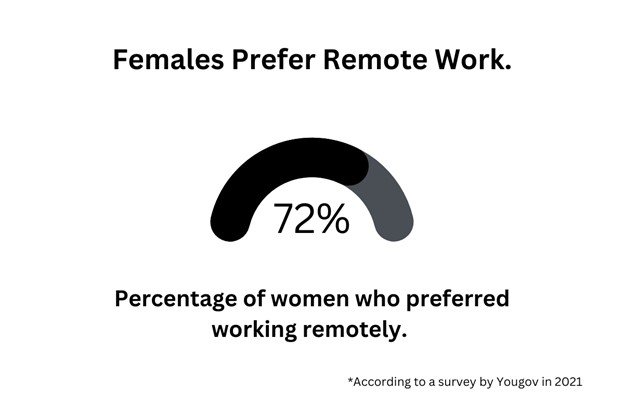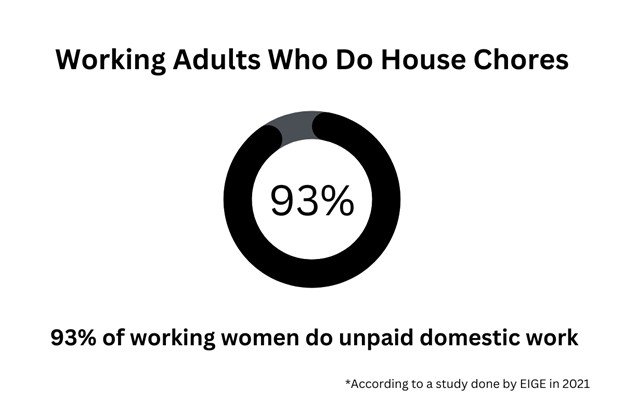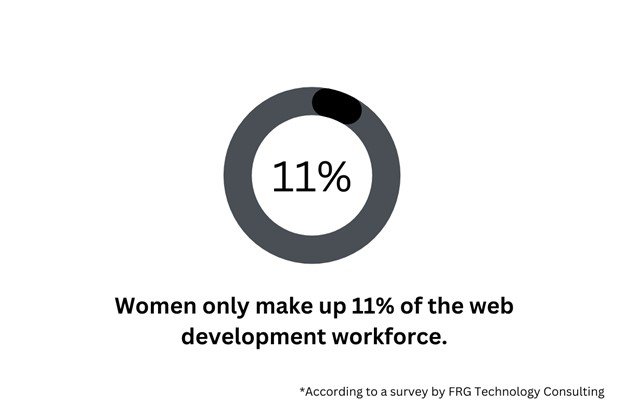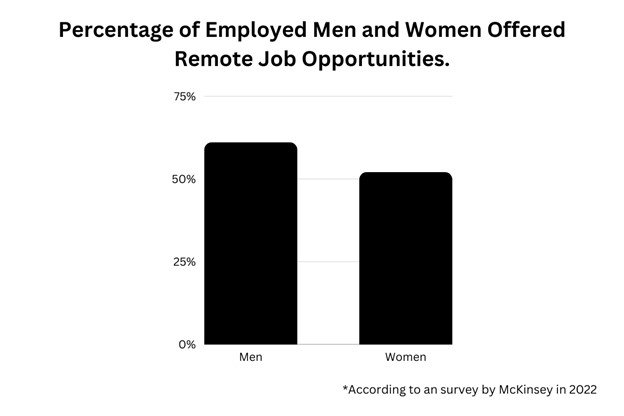Females play an instrumental role in the modern business world.
The advent of remote work affected everyone, including women. It has become easier than ever for employees to work from the comfort of their homes.
But did it affect women differently than it did men? How is it different for women?
This article looks at females and their relationship with remote work.
Remote Work For Female Statistics in 2024
Key Stats
- According to a survey by YouGov, America, with a sample of 4,000 working adults in the United States in 2022, 72% of women were interested in working from home, compared to 57% of men.
- According to FlexJobs, Sunrun, Smartsheet, and IBM are some of the agencies that have facilitated virtual work since 2021.
- According to an article published by The Brookings Institution in October 2020, remote-working mothers dedicated more time to taking care of their families and household in lockdown. This made it difficult for them to manage their jobs.
- 61% of men have been offered to work remotely compared to 52% of women, according to a McKinsey American Opportunity Survey from March 2022 to April 2022.
Do Women Prefer Remote Work More Than Men?
According to a survey by Flexjobs in 2021, most work was done remotely amidst the pandemic. The significant impact the pandemic has on remote work can not be ignored.
Furthermore, evidence from the Flexjobs survey revealed that 68% of women prefer working remotely, while 57% of men prefer to work remotely post-pandemic. Flexjobs surveyed 2,100 people between March and April 2021.
Flexjobs is a remote work platform like Upwork, and Fiverr that has helped millions of people around the world find remote jobs over the past decade.
According to a survey by YouGov,
- 57% of females from the United States prefer home-based opportunities, compared to only 44% of men.
- More than half of the workers desired to avail of hybrid work or permanently go for remote work options.
- Similarly, 72% of women were keener to work with adjustable locations compared to 57% of men.
- And, as expected, 43% of men were more hypothetically willing to work permanently at the employer’s given destination, compared with 28% of women.
You Gov is a market research and data analytics firm headquartered in the UK. The participants of the survey were 4,000 independent adults in the United States.
The YouGov findings also indicated a lack of ability by employers to be accommodating when it comes to supporting child care, home chores, and elderly care.
Therefore, considering the disparities between genders, companies that provide flexible work policies are likely to get a positive response from their workers.
The authors of the McKinsey report highlighted in December 2022 that companies who take advantage of the current opportunities would be secure and keep female leaders, which will create a better work environment for all.
The pandemic has forced corporate America to rethink how they work. After two and a half years, employees no longer want to return to the traditional workplace; they want to move forward.
Why Do Women Prefer Remote Work?
Remote work is an entirely different experience for employees used to the usual on-site 9-5 office day. It can be both challenging and rewarding, depending on the individual. Remote internships and job opportunities are a great way for women to develop their careers internationally.
RemoteDesk published an article about why remote work is better for women in July 2022. The following are the reasons why remote work may be the ideal choice for female employees.
Remote Desk is an AI-based remote workforce management solution for the IT sector, law firms, and general work-at-home policy compliance.
-
No Commutes
Going to work every day can be taxing. Not only is there the strain of traffic, but also the hassle of public transport. Remote working eliminates all of these worries.
The best part is that you can save money on fuel or gas.
-
No Dress Code
Also, no dress code means no need to spend money on clothes. Employees can wear whatever makes them feel comfortable.
-
Safe Workplace Environment
Politics and competition in the workplace are common occurrences. However, an unhealthy working environment can take a toll on you mentally and physically and negatively affect your productivity. Additionally, many companies fail to create a gender-neutral environment, and women face issues like harassment. Working from home can be a great way to ensure safety while remaining focused.
Women, especially women of colour and those in upper-level positions, have often been left out of office conversations.
According to Tara Van Bommel’s remark in 2021, remote work offers an escape from the microaggressions they would face in person, and they fall victim to sexual harassment.
The Stigma Against Working Mothers
According to a Vox article on the subject published in July 2021, mothers, in particular, face stigma in the workplace. Fathers are seen as someone wanting to provide for their families when they become parents. On the other hand, when women become mothers, people expect them to reduce their paid work activity, adversely affecting their career prospects.
Women are more likely to desire to work from home than men but also report higher stress, depression, and hours worked – especially if they are mothers. This phenomenon is due to them attempting to make the best choices for their career and managing an equal role in society and at home. Women need more flexible work options because they have comparatively higher workloads.
Vox is a news outlet that reaches around 20 million people each month.
Dealing With a Lack of Appreciation
According to a McKinsey report, female leaders shifted their jobs considerably in 2021. The McKinsey report was a part of The Hill’s Changing America blog published in 2022. According to the report, women deal with external resistance to accentuating their performance in their respective companies. Women also receive low acknowledgement for their efforts. Furthermore, the addition of exclusionary behaviours has fueled their preference to work remotely.
Data records clearly depict that female leaders are incorrectly viewed as someone with a low-ranking status. Unlike male leaders, their ideologies and skills are often attributed to associates.
-
Woman Empowerment
According to the Vox article mentioned above, women have advocated for remote work for a long time. Generally, they think its positives – letting them do everyday domestic tasks and bypassing a workplace-focused model typically advantageous to men – outweigh the negatives. As more people, in general, are working remotely, lingering apprehensions about remote work will likely dissipate.
Similarly, according to the Flexjobs survey we mentioned above, 69% of men and 65% of women claimed that the expansion in remote work strategies would have improved gender equality.
-
A Better Work-Home Balance
Women have been doing double the work for years before and after the pandemic, and remote work helps make an already exhausting situation more tolerable.
Childcare and extra chores have become more difficult during the pandemic, but it was already quite demanding before it; remote work makes it more palatable. Collins stated that “remote work grants individuals with caring duties greater control over their timetables so they can provide the needed assistance”.
It is also worth noting that offices have never been especially welcoming spaces for women due to late hours being praised and bosses expecting after-hours socialising. At the same time, their partner took up the slack at home, which generally benefits men rather than women. EIGE suggests that 93% of working women have the dual burden of unpaid house chores, compared to 53% of employed men.
Furthermore, in May 2021, Axios released an article in which they talked about gender division in remote work. Interestingly, it stated
- More women preferred to work remotely than men.
- 70% of women expressed that the benefit of remote working does not have to dress, compared to 57% of men.
- In contrast to 48% of men, 60% of women enjoyed working in flexible, remote job opportunities.
Axios is a news outlet known for its ‘Smart Brevity.’ It had around 12 million unique monthly visitors by late 2018.
The ability to be remote has been a blessing during the pandemic for working parents. It allowed them to safeguard their children and jobs. Thus, the emphasis on why it has been feasible for women to work remotely has been clarified thoroughly.
The Industries With the Most Remote Female Workers
In 2021, Forbes published an article about the 28 best remote-friendly companies.
The list showcased the highest-rated employers for women who prefer a remote-working environment. These companies have been widely lauded by their staff for supporting women and creating positive working atmospheres. The data was derived from a report by Flexjobs.
Forbes is a global media company which reaches around 150M people across the globe every month. It is famous for its lists of personalities like billionaires, entertainers, self-made women, and so on.
According to Carol Cochran, Vice President of people and culture at FlexJobs, working remotely can provide more opportunities for women, allowing them to manage their professional lives more efficiently. She believes that remote work environments can benefit women at any stage of their careers, giving them greater freedom and independence.
Additionally, she emphasises the importance of company culture, stating that the companies on this list offer remote work options and support and empower women by creating a culture that accommodates their various responsibilities. She believes that the flexibility of remote work gives women the opportunity to excel in their careers.
Due to a lack of data pertaining to overall industry data, we will use job roles as a proxy.
The following are the industries that may provide women with remote work opportunities.
-
IT Industry
Most of the companies referred to as most remote-friendly for women by Flexjobs are those which belong to the Information Technology (IT) industry. The companies mentioned are the following:
- Zoom Video Communications: Offers state-of-the-art video communication services for businesses, which include audio and video conferencing, team collaboration, instant messaging, and online seminars.
- Smartsheet: A cloud-based platform that assists users in organising, automating, capturing, planning, monitoring and scaling their work, enabling them to bring their ideas to fruition swiftly.
- LogMeIn: A software company that makes it easy for people to connect with one another to enhance relationships and achieve better results for individuals and organisations.
- RingCentral: A software company specialising in phone systems for business purposes.
-
Healthcare Industry
In the health industry, many companies provide satisfactory environments for women. These include:
- CVS Health: An American health corporation which deals with health solutions and owns its own pharmacy.
- LHC Groups: A healthcare provider company which provides post-hospitalisation services such as hospice services, home health, etc.
- PRA Health Services: A global research organisation developing medical drugs.
-
Marketing and Consulting Industries
- Thomson Reuters: A firm that delivers insightful information to professionals and businesses in the financial, legal, tax, accounting, healthcare, science, and media sectors.
- IBM: A worldwide consulting and technology firm that offers a variety of products and services, including hardware, data and analytics, eco-friendly solutions and mobile solutions.
- American Advisors Group (AAG): A company centred on helping people convert the equity in their houses to cash.
For the US and the UK
An article demonstrating the percentage of jobs which are remote for a role in 2022 was published by Remote. It stated statistics pertaining to both the UK and the US.
Remote is a company aiding in global employment irrespective of physical presence through remote work. It has over 900 employees worldwide.
According to their data, the dominant industries with remote female workers were as follows:
-
IT Industry
Web Developers
In the UK Information Technology industry, remote web developers, as stated by Remote, made up 31.39% of the jobs available. We can calclulate how many females make up the remote web development roles through an article by FRG Technology Consulting, stating that women only make up 11% of the developer workforce.
FR Technology Consulting is a recruitment company for IT and technology-based companies. They have over 150 recruitment consultants.
Software Engineers
The Remote article also stated that 29.14% of software engineering jobs in the UK were remote. A Statista report stated that women only made up 5% of software developer roles in 2022 globally. It can be assumed women there was a fairly small number of women in software engineering jobs.
Data Scientists
Data scientist remote jobs in the UK IT industry made up 30% of those data scientist roles. At the same time, the percentage of women in data science was only 15%, according to Aston University. Through this information, we can assume there is a low number of women in remote data scientist jobs.
Aston University is a business school providing online DBA, MBA and MSc programmes and is accredited by AASCB, AMBA and EQUIS.
-
Publishing Industry
Editors
According to the Remote article, 21.29% of editor jobs are remote in the US. However, the field of editors is female-dominated, as seen by a Zippia report. It stated that 53.2% of editor jobs are made up of women in 2022.
Zippia is a company dedicated to helping users find jobs and careers.
Copywriters
Moreover, the Remote article stated that 21.9% of copywriting jobs were remote. According to a report by CareerExplorer. 69% of copywriters were women in 2023. Thus we can draw conclusions on the percentage of women in these roles.
CareerExplorer is a platform providing sources and information on jobs and careers.
-
Consulting Industry
The remote article further stated 16.97% of consultant jobs were remote in the US. On the other hand, another Zippa article report showed that 41.6% of consulting jobs were made up of women in the US in 2022.
-
Marketing Industry
Moreover, the Remote article reported on 16.04% of marketing roles being remote in the US, while specifically in North America, 60% of women had marketing jobs. LinkedIn reported on the statistic in 2021.
The Impact of the Pandemic on Women Working Remotely
-
Quitting or Putting jobs on Hold
The global pandemic has greatly affected women working remotely. We can use an article published by Forbes in 2021 to explain the impact of the global pandemic on teleworking women. The Forbes article “Women And The Pandemic” mentioned that the pandemic had presented women with new challenges.
The article mentions a survey conducted by the University of Pennsylvania in April 2020. The survey consisted of a sample of 2,200 US adults. Compared to men, women working remotely were more likely to take care of their children and do household chores alongside their work.
Moreover, the article also refers to a McKinsey study conducted in July 2020. The McKinsey study demonstrated that more women dropped out of their jobs due to the pandemic than men. Furthermore, workplace gender inequality existed before the pandemic, but no measures were implemented to address this.
To explain the harmful impact of the lockdown, we can also use an article by the Brookings Institution published in October 2020. The Brookings Institution study confirmed that working mothers dedicated more time to household and childcare responsibilities due to the lockdown. Furthermore, the lockdown greatly affected women as the overburdening home responsibilities made it difficult for them to manage their careers.
-
Gender-Roles Narratives Boost
Since the pandemic, gender roles have become more conservative, inculcating a sense of workplace inequality between males and females. Moreover, we can refer to information from a Vox article on remote work being a blessing for women published in July 2021.
The Vox article also includes research published in May 2021 by the American Sociological Association’s Journal. The article states that after the lockdown, most people think women should stay home and manage household responsibilities.
-
Damaging Future Chances of Growth
Between August and September 2020, Deloitte surveyed 385 working women to review the impact of the pandemic on working women. All the women were engaged in various job roles and worked for organizations with at least 1,000 employees.
The Deloitte article mentions that 7 out of 10 working women think the pandemic may hinder their career advancement. Additionally, 70% of women have expressed that the global pandemic has negatively influenced and disturbed their quality of life.
The Deloitte study also revealed that working remotely during the pandemic had an unfavorable effect on their lives. 40% of working women reported that they could not balance their work and family commitments. In comparison, 40% of teleworking women reported that their health and mental well-being had been severely affected during the pandemic.
Similarly, according to the Flexjobs survey mentioned above, 20% of men and 13% of women believed that this shift towards working remotely rather than on-site had hurt their chances of advancement in their respective fields. However, realizing that most of the tasks can be done remotely has made people apply for home-based opportunities.
Caregiving Vs. Non-caregiving Women
According to the Deloitte survey, working women with and without caregiving duties were affected differently.
Here are some of their findings:
- Almost 48% of working women with caregiving responsibilities experience great difficulty managing their careers and household responsibilities.
- In contrast to caregivers, non-caregivers experience adverse effects on their physical (49% vs 38%) and mental health (44% vs 37%).
- However, 53% of non-caregivers think they need to always be online for their work, compared to 44% of caregivers.
Are Men Offered Remote Roles More Than Women?
Men Get More Remote Roles than Women
We can use an article by the Fortune magazine to explain the association between gender and the number of remote work opportunities. The Fortune article published in June 2022 states that men are more likely to grab remote jobs than women.
Fortune is a business-centric global media organization with around 5 million readers across the globe.
The Fortune article refers to a McKinsey American Opportunity Survey, which assesses remote opportunities. It was conducted between March 2022 and April 2022.
Out of 25,000 participants, employers offered almost 61% of men the option of working remotely. However, only 52% of women were offered remote job opportunities. Moreover, the survey found females and males opted to work remotely for 3.1 days and 2.9 days, respectively.
Women Report Higher Productivity and Yet May Not Get Offered Remote Jobs as Much
We can also use data from an article published by the Society for Human Resource Management (SHRM) in July 2021. In particular, the Society for Human Resource Management article talks about the different remote working experiences of males and females. Almost 40% of women reported being more productive working remotely than 35% of men.
Last, we use information from a Lano article published in June 2022. The article states that gender inequality has increased due to remote working. Lano is a cloud-based platform that allows global businesses to hire, manage and pay employees worldwide, making it credible.
The Lano article cites a study executed by the Pew Research Center to evaluate male and female remote work experiences. The survey concluded that 51% of working mothers struggle to excel in their careers due to being a working parent. In contrast, only 16% of working fathers find it harder to advance in their careers.
Conclusion
Although remote work has significantly changed working life, it has also become more feasible for some workers, especially females. Alongside working in their houses and doing domestic chores, it was more suitable for women to perform their jobs on in the flexible manner that remote work allows. Many companies offer remote jobs, which has been a great way for females to carry on their careers.
However, the global pandemic has negatively affected almost 70% of women, as most teleworking women face difficulties managing their careers and household responsibilities. Compared to 57% of men, nearly 68% of women prefer to work remotely post-pandemic, and it should be noted that men and women get paid differently based on their genders regardless of their positions.









![How to Maintain Work Life Balance while Working from Home? [14 Ways] 10 Maintain Work Life Balance while Working from Home](https://zoets.b-cdn.net/wp-content/uploads/2023/03/Maintain-Work-Life-Balance-while-Working-from-Home-scaled-e1678963334746.jpg)
![Remote Work Statistics Europe (2023) [100% Updated] 11 Remote Work Statistics Europe](https://zoets.b-cdn.net/wp-content/uploads/2023/02/Remote-Work-Statistics-Europe-1-scaled-e1676629834594.jpg)



